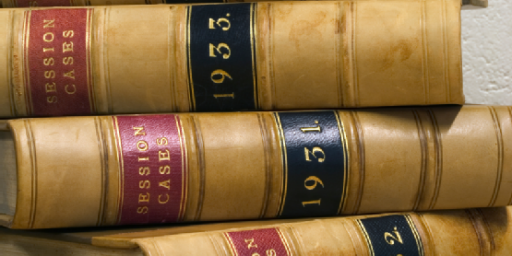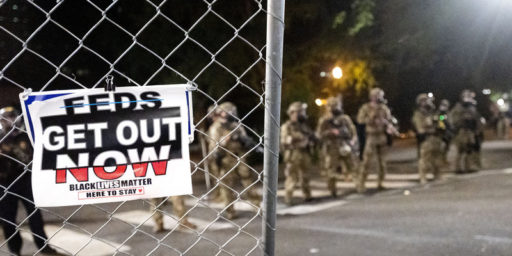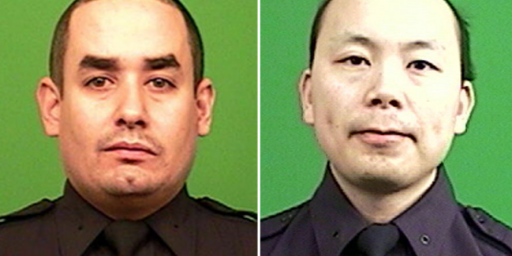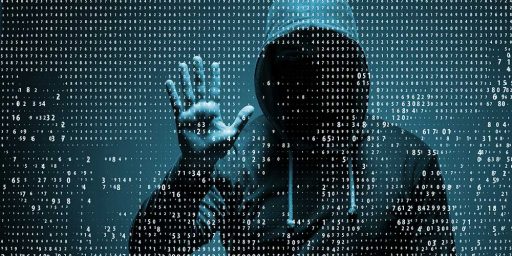Dial 9-11 for Police State
Washington Examiner columnist Melanie Scarborough believes the recent tasering incident at a John Kerry speech at the University of Florida, and particularly the students’ passive reaction to it, is a sign of something truly depressing.
Try to imagine that happening on a college campus in the 1960s.
In fairness, the Florida students had little time to react at the moment, and many of them have belatedly. Nonetheless, their nonresponse is worrisome because today’s college students are the first generation to mature in the post-9/11 world.
This year’s freshmen were 12-year-olds on Sept. 11, 2001, which means they have only a vague recollection of life in a free society. To them, it is normal to be stopped and searched before entering public facilities. They think nothing of police officers capriciously demanding that they produce identification. They have been trained not to question their government.
Since 2001, the United States has undergone a subtle, but tragic, transformation from a nation where citizens were free to do as they wished as long as they broke no laws to one where they are free to do only what their government expressly permits. And unfortunately, one of the things the government most discourages is dissent.
She notes that anyone wishing to assemble to protest in D.C. must now apply for a permit from the Park Police and, if allowed to exercise their 1st Amendment rights, they must do so “herded by an army of police officers, and their movements will be recorded by close-range surveillance cameras.”
As I’ve noted many times, we’ve got the same mentality now at the nation’s airports, where taxpaying citizens must silently and patiently endure unreasonable searches by poorly trained and surly federal agents on the incredibly unlikely event that one of their fellow passengers is planning to hijack the plane. Like good little boys and girls, we put our toiletries in 6 ounce bottles in plastic bags of government specification to facilitate more easy searches and then, like sheep, we strip off our belts, take off our shoes, and empty our pockets while hoping that the TSA agents don’t single us out for extra special scrutiny. All the while, we dare not complain or make a joke.
Yet, few seem to think any of that is problematic because, well, “Everything changed after 9-11.”






“This year’s freshmen were 12-year-olds on Sept. 11, 2001”
Easily the scariest thing I’ve read all week.
Police brutality was far more prevalent 20, 50 or 100 years ago than it is now. Just because something bad happens doesn’t mean things are getting worse. Is there any historical perspective on anything anymore?
I’m dubious that it was worse 20 years ago; maybe 50 and certainly 100. But so what?
What Scarborough is talking about, though, is the docile acceptance of the need to bow down to authority figures. That’s not a healthy trend.
ACLU, anyone?
You might have had me with the permit to protest, etc. But you don’t have a right to fly. If you don’t want to go along with TSA rules, drive. You also don’t have the right to interrupt a speech and act like a belligerent ass.
Your point may be valid, but most of your examples are severly lacking.
So don’t fly. You can drive just about anywhere in the country given enough time. If your destination is overseas (why you’d want to go to any country other than this one is beyond me) you can surely take a ship.
Err, it did. To deny that things changed on 9/11 is to put one’s head in the sand.
The protestors did this to themselves. I haven’t ever checked but I’m guessing that they don’t clean up after themselves. Police need to be there because of the dipsticks that always find a way to cause trouble. All of these people can still exercise their 1st Amendment rights by writing letters/E-Mails to their elected officials or newspaper editors among other things. Marching down Pennsylvania avenue or converging on the mall are not the only ways to voice your opinions.
If you are not going to follow the rules “bow[ing] down to authority” as Scarborough puts it then we don’t really need a government at all.
This is a tough one. Since the public park issue is used as an example I would say public land is for the enjoyment of all. Do I have a right to enjoy public land without the intrusion of a group of protesters interrupting my day of relaxation? Do I, as a protester, have a right to disrupt other folks enjoyment of public property? Is it reasonable for me to be able to know what the registered used for a piece of public land will be for a day I also visit? I think having to register a protest for a piece of public land is no more offensive than having to reserve or register for a pavilion on a piece of public property for something like a private family reunion. But it is wrong for the government to tape it if no crime is being committed.
I am sure the government is more concerned about dissent in this age when it is so easy to transmit local events globally if the relevance warrants it.
I wouldn’t put the two trends together at all.
What we saw in the crowd’s reaction to the Meyer tasering is a basic fact of mass psychology. Most people don’t deeply evaluate the meaning of events when they happen, they just have surface impressions and go with their gut reaction from these impressions. And from the looks of the video and some of the cheering when Meyer got grabbed, I’d say the surface impression many of them had was “This guy is an ass and deserves what he gets” not “This guy is rude but doesn’t deserve to have his rights trampled upon because doing so takes away my rights.”
Moreover, people just don’t get involved in someone else’s struggles unless they’re exceptionally ethical persons (the archetypal Good Samaritans) or somehow identify with the parties involved. And if anyone thinks this kind of reaction a new, post-9/11 phenomenon, just consider the Reginald Denny beating during the LA riots. How many passersbys stopped and protected Denny from having his brains bashed in? The ones who didn’t stop aren’t bad people per se, just uninvolved and sadly average. We could go further back and talk about the example of Kitty Genovese, whose neighbors listened through her crime, or return to the present and look at all the speakers who’ve been “pied” by protestors — why didn’t the audience protect the speakers in question when the protestor attacked?
Finally, the example of the 1960s students vs. today’s students falls flat because the students, while partisan, are simply not politically charged. When liberal Democrats and conservative Republicans alike snipe at “damned dirty hippies” on campus, as they did during my time at Florida State, you know that the narrative has changed and the average liberal doesn’t see connections between himself and the activist left.
I’m a little hazy on how we jumped from “obnoxious asshole directed to leave the premises when he disrupts the function, refuses to leave, forced to leave, resists force, forced to comply anyway” to “free to do only what their government expressly permits.”
I must be descending into crotchety-old-bastard-ness.
Mr. Meyer quite frankly deserved what he got. Not because of what he said or tried to say but for not obeying the police officer’s commands. He could just have easily sat down on his butt and made the police drag him off instead of doing all that fighting. If he had done that and still gotten tased well that would be another matter entirely. He made a bad choice when he decided to resist and bad choices most times have bad consequences.
As Paul Harvey used to say, “And now . . . the rest of the story.”
After the forum, John Kerry’s statement about the incident referred to Meyer’s “..barging up to the microphone…” A UF student also working as a CNN reporter reported that Andrew Meyer cut to the front of the line & took over the microphone, interrupting the speaker who was announcing the end of the Q & A session. At that moment is when Campus Security closed in on Meyer, yet deferred to John Kerry’s plea to let him ask his question. This does not appear on the video that Meyer had a friend take of his performance. It was only after about 90 seconds of Meyers rant, several requests to wrap it up, & several seconds after the mike had been shut off, that the cops moved in to escort Meyer from the room. Meyer was tasered only after repeatedly breaking free of the cops & repeated warnings to cooperate.
The student reaction was anything but passive. They applauded & cheered the police when they tried to escort Meyer from the room.
My first impulse to someone grabbing a microphone out of my hand would be to deck him. Seems to me the authorities showed admirable restraint.
http://www.cnn.com/2007/US/09/19/cnnu.tase/index.html
I agree with your overall assessment of everything changing after 9-11, & the “You’re either with us or with the terrorists” mindset. The UF taser incident is just a lousy example to use considering ALL that occurred there.
James,
Police brutality 20 years ago was considerably greater and generally tolerated compared to today. Police departments such as Philly, NYC, LA, and Columbus routinely pounded the crap out of people with little consequence. Cops not being punished for putting suspects in the hospital seems to me to be passive.
How is resisting arrest (and at first simply a request to leave) from four police officers passive. And how much risk do you think the police should place themselves int before they use force?
I’m sorry, but these conclusions are coming from left field and are nothing but inflammatory. First, our governments, Federal, state and local have always written laws to restrict our activities. What’s left is allowable. What laws have been written since 9/11 that tell me expressly what I can do? Is there a law that tells me I can read a book. I bet I can do that without breaking the law. Of course, the Bill of Rights restricts the government in their ability to restrict certain of my activities and so you could say that this expressly grants me permission to do something. But I don’t see how that has changed.
Second, what were the students at the school supposed to do? Does Ms. Scarborough want the students to physically stop the police from continuing. That has always been illegal. Even before 9/11.
Third, The pre 9/11 security and mindset allowed four planes to be hijacked and used as weapons against the American people. How does Ms. Scarborough purpose we prevent this from happening again? Plus, this is an example of express restrictions and not express permissions.
I am not convinced of Ms. Scarborough conclusions. She may be right in her conclusions but the examples do not warrant the conclusions.
I have to agree with the others here who pointed out that this had nothing to do with the idiot who made such an ass out of himself at the Kerry event.
After seeing some of the other videos, and reading some of the other first-hand accounts, I think most people would have agreed with the “they should have smacked him a few more times” point of view.
Your freedom of speech does not extend to the freedom of making everyone else’s life more unpleasant just so you can have a few laughs at the local pub afterwards, or make a few points with the pseudo-anarchist chick who sits next to you in your “Crimes of Western Civilization” class.
I’m sorry but the parks in DC is not ‘public land’ it is specifically owned by the government (either city of DC or federal land, I don’t know which).
While the ‘government’ allows public access to them for leisure. Protesting as it has become is quite disruptive and in many cases destructive (not only graffiti, but to the grass which has to be replaced, and flowers, etc).
Just because the ‘government’ of the people owns it, doesn’t mean “the people” get free access to it. You see gates on many access roads in mountains for fire roads, but they won’t let off-roaders go up their by themselves.
The government should have every right to protect itself from vandilism as any other private owner does.
This year’s freshmen were 12-year-olds on Sept. 11, 2001, which means they have only a vague recollection of life in a free society.
Holy hyperbole, Batman!
Someone needs to get a grip.
One of the first things I remember learning and internalizing about America, even at a very young age, was the notion that if you were arrested by the police for any reason, you were absolutely guaranteed some kind of trial or hearing to try and get out of jail. Can anyone make that claim today.
James Joyner: “I’m dubious that it was worse 20 years ago; maybe 50 and certainly 100. But so what?
What Scarborough is talking about, though, is the docile acceptance of the need to bow down to authority figures. That’s not a healthy trend.”
In addition, what we’re seeing is well-documented police brutality, where it’s not just the word of a groups of police officers against the word of the guy with the bruises.
And the reactions of the various commenters on this thread are pretty good support for the idea that things are getting worse.
The United States is by no means the Soviet Union or Nazi Germany. Still, we’re becoming decidedly less free.
Here’s a good post expressing shock that so many people think “being a jerk” is now something that entitles police to use force.
Why it was necessary to taser the guy once he was down was especially mysterious.
Mr. Myers was tased because he was stupid. All he had to do was stop being stupid and he wouldn’t get tased.
For my part, you want to search me you had better be ready to charge me with something. I will ask if I am under arrest. The agent tells me I am not under arrest, I will refuse to allow the search. If I am then charged with resisting arrest I will know what the original charge is, or I will raise bloody hell. I will take what legal steps I can to see that justice is done.
A person can only be charged with resisting arrest when he was under arrest in the first place.
A person can only be searched when the agent has reasonable suspicion that the person has committed a crime, is in the act of committing a crime, or when the subject has been arrested for a crime. Refusing to submit to a search is not ipso facto proof of a crime or otherwise justification for a search.
Water, shampoo, and formula do not go BOOOM!
The Prince of Pompadoodle
By Walt Kelly
The Prince of Pompadoodle
Lived behind a castle wall,
Behind a moat, behind a guard
Of twenty soldiers tall.
The Prince of Pompadoodle
Was the safest man alive.
Each day he wrote how long he’d lived
And multiplied by five.
The Prince of Pompadoodle
Would survive, he did decide,
Five times as long as he had been
Alive before he died.
The Prince of Pompadoodle
Called in the castle sage
For his advice in this pursuit
Of long and fulsome age.
The Prince of Pompadoodle
Heard in horror from this friend
That somewhere in the palace
Was a cur who’d seek his end!
The Prince of Pompadoodle
Scarce could credit a belief
His years might soon be sneaked away
By some ungrateful thief.
The Prince of Pompadoodle
Sent his every friend away
And sat alone, safe, locked alive,
To count another day.
The Prince of Pompadoodle
May hoard each empty hour,
But none can know; no word comes from
The silent stony tower.
Non-linear thinking isn’t your forte is it? Of course it can be getting worse, it may not be as bad as 100 years ago in terms of police brutality, but that doesn’t mean we should merely say, “Oh well, it isn’t as bad as 100 year ago, sure you can strip search me.”
Actually this is precisely James’ point. What we were once able to do we are no longer able to do it on the flimsiest of reasons. And if you become unpleasant about it while at the airport because some of the stuff they are asking us to do isn’t simply stupid but blindingly stupid then you get to spend some pretty close and personal time with the coercive powers of the state.
But everything changed after 9/11! Don’t you understand?
But everything changed after 9/11! Don’t you understand?
If I don’t understand, does that entitle the police to use force on me?
Of course, because you are clearly a traitor and objectively supporting the enemy.
I am completely at a loss to understand why anyone would choose to portray someone who violently resisted arrest into a hero, and why anyone would choose to portray on-lookers who failed to start a riot into moral failures.
Nor do I agree with the proposition that the United States is “less free” today than it was before 9/11 because, for example, you have to stand in longer lines or take off your shoes at airports. Is your concept of the essence of “freedom” so shallow that it turns on such trivialities? Shoes on, quick check-in = FREEDOM, yay! Shoes off, stand in line = TYRANNY, booo! And where did you get the idea that safety precautions made prudent because of the barbarity of our enemies can be equated to a deliberate government suppression of liberty for some nefarious purpose (e.g., perpetuating a dictator’s reign)?